Don't wanna be here? Send us removal request.
Text
As I was watching the film, I hadn't personally made the connection between chihiro and nature. The more I think about it, the more I start to agree with your statement. A sense of love blossomed between Kohaku and chihiro and given his nature as a water spirit it feels like a strong assertion. Additionally her relationships with all of the spirits, who represent aspects of nature and reality grow throughout the film as well.
Spirited Away
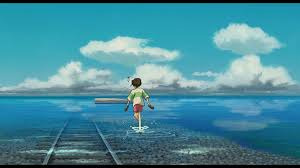
Studio Ghibli films, like this always give such a good sense of connection to the world. One can never go wrong by watching one of their many and great films. It makes sense that these films have preserved so long because they give people the same feelings. By watching spirited away, many scenes that bring pleasure and a sense of peacefulness is when Chihiro is interacting with the nature. The film starts off with her parents driving into and through the forest. While Chihiro initially found nature and interacting with it frightening, we see her develop throughout the film and gain a greater appreciation for it.
Chihiro even interacts with Haku who turns out to be a water spirit. This is just another sign of how important this film is as a pathway to nature and bridging the connection. Chihiro found out that Haku was the nature spirit by remembering her own childhood of being in the river and losing her shoe. Another way to see that the connection to nature has grown within Chihiro is by noticing in the beginning scenes she is holding on to some flowers. These flowers represent her connection to nature and as she desperately grasps onto them, she begins to make them wither faster. By the end, Chihiro no longer needs to maintain the connection through flowers anymore but can relive and reconnect through her memories of her time in the spirit town.
If Chihiro represents the connection to nature, then most of the other characters represent their connection to work life and industrialism. Everyone is forced to have some type of job unless they are a paying customer in the town. This moto is even a promise that Yubaba maintains, giving anyone a job who asks for it. The consumption of work life is repeatedly demonstrated, and it is only on limited occasions and by some characters that get to interact with nature. If Yubaba is the representative for Industrialism, Zeniba is the representative for nature. Zeniba lives far out from the industrial style bath house and stays in a modest home. She is surrounded by nature and invites those that come to her home. She even pushes for no face to stay and help her around the house upon Chihiro’s departures.
Chihiros parents represent a false and limited connection to nature, repeatedly demonstrating the satisfaction of their own interests. This starts off by them walking into what they thought was an amusement park and eventually eating food that was set without permission. Their strength of character is demonstrated here in comparison to Chihiro who refuses to go along with it even though her parents have begun to indulge. While we don’t see the parents until the end, when they get back, they complain to Chihiro for her delay and are upset about the car being covered with nature. This is likely a representation of how many see nature. Only using it for their benefit, as their satisfaction with nature ebbs and flows.
2 notes
·
View notes
Text
Spirited Away
This movie definitely had a very strong theme of finding oneself and staying true to yourself. In the beginning we watch Sen and her parents enter the other world, where her parents quickly give way to gluttony losing themselves to the food, inevitably turning into pigs. When they first transform they still have shreds of themselves present via the parents hair and clothing in their pig forms; however, later in the film when Sen goes to the pig pen we become lost as all the pigs look the same. We are led to believe that her parents are among the drove of pigs, but where? If they are there they no longer have their distinguishing features from before, so are they even there? Their selves were lost, and the only one who could potentially save them is their daughter Chihiro (AKA Sen), who managed to hang on to herself completely until she signed a contract with Yubaba. After she signs the contract she forgets her name until she finds a card with her name on it that she brought into the spirit realm with her. As the story progresses she is able to help reveal the truth about Haku's true identity as Kohaku river and help him escape from Yubaba, taker of names and identities.
In conjunction with the preservation of the self, this movie explores the effects of over indulgence and the effects that has on one's self. There are several examples of over indulgence completely changing people within the film, from the transformation of her parents, to the faceless one becoming this spirit eating monster, un-feeling of Sen's emotions. In the beginning it seems that the faceless one is completely enamored with Chihiro, looking to help her at any and every opportunity, but once he gains access to the bath house and indulges in its delights he changes and transforms.
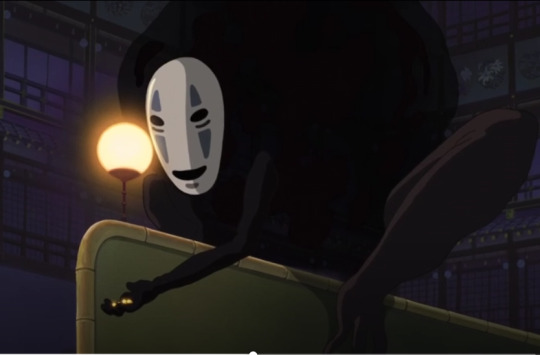
He begins to eat anything and everything, becoming tyrannical in the process, throwing fits for anything that didn't go exactly his way. It takes Sen taking him away from the place of indulgence and exercising the "sickness" out of him. He offers any of the staff as much gold as they desire, but we soon realize that all of it was fake as Yubaba reveals when she is looking for her baby, Boh.
Speaking of Boh I loved his character development. He starts as a spoiled brat that gets anything he wants when he cries for it, but after Zenibaba turns him into a rat? mouse? whatever he was, he finally has to grow and deal with things on his own. It takes him from legimately being incapable of standing, to standing up on his own in defiance of Yubaba when he is standing up for Chihiro. Not only does he gain physical strength, but strength of character, focusing not only on his wants but on others as well by the end of the film. maybe with a little more training and a bit more strength he can finally reach peak "praise the sun" form.
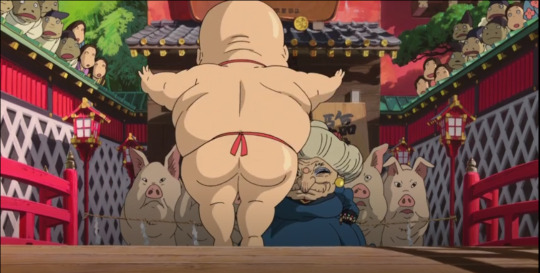

7 notes
·
View notes
Text
Sukiyaki Western Django
Taking Dr. Felts Samurai War Tales class really augmented my experience for this movie. In his class we watched Yojimbo and fist full of dollars (a western remake of Yojimbo), so watching this movie, which is packed full of references and over the top scenes relating to those movies in addition to Django was absolutely nuts.
I feel conflicted as to whether or not I liked this movie, because on the one hand it was funny, but on the other it was funny because it was stupid. Part of me feels like I wasted an hour and a half of my life watching some godforsaken abomination created by a couple of students who couldn't take their film class seriously, which is perfect, but on the other hand why am I watching this. As I'm writing this I'm laughing about the movie still, so overall a good sign I think, but man was this movie stupid (in a good way).
I like how unsubtle this movie was about its references. It directly quoted bits from other movies, calls out character references (for example when they say the gunman shouldn't try to pull a Yojimbo on them), and overtly pulls different pieces from all these different stories without mixing it up. When there is a reference, you aren't confused as to where it came from, assuming you know the movies its referencing in general.
On the other hand, in order to really enjoy this movie, you have to be really well versed in all of these different movies. The movie seems to be made for a niche audience who has seen Yojimbo, Django, Fist full of dollars, knows the tale of genji, and ideally a bit about the war of roses... and those are just the ones I could name off the top of my head. There could be even more references in there that I purely missed.
3 notes
·
View notes
Text
While it was sad that Tokue was fired, I think it was a really important shift for Sentaro's life. I don't know how, but somehow, he manages to go solo in the end, and if the injustice towards Tokue hadn't happened, I don't think he would have had the strength.
Sweet Bean
Going from horror to this film was an absolute trip and a half but at the same time that’s what’s great about cinema and how the two can coexist with one another. But to start getting into the film I just wanted to say how crushing it was to see Tokue be fired from the job purely because of her past with leprosy. This kind older woman reminded me a lot of my grandmother so it made me think a lot about her throughout and I’m happy I still have her around but I can’t imagine not knowing I could visit her or she didn’t get to do everything she wanted to do in life. The ending of Tokue saying that she was just happy for the time that she got to spend doing what she liked made me really sad and grateful for the time I have on earth as well. It sounds kind of cheesy but I truly do feel this way as I really do think this movie had some good messages about enjoying the place you are in even if it may be hard. Especially as a college student the world can seem caving in on you sometimes but you have to take a step back sometimes and realize it's not all about me and there’s more to life than this. Do what you want to do in life and enjoy it, it will take effort and lots of hard work to get there but at the same time that’s something to look forward to. I really liked this film a lot more than I expected to and I think these types of films get overlooked a lot because there is quite a few of them that may teach the same message over and over again but at the same time why is it a bad thing to learn the message of kindness and to enjoy life necessarily a bad thing. My one negative to the film though however was the inclusion of the school girl because I think she did have some importance to the overall story but at the same time I just felt like she wasn’t absolutely needed and was more brought in to just move the story along and find story details out which is yeah I guess understandable but at the same time it just seemed unneeded, I don’t know. Overall, this was a nice palette cleanser before getting to the final films of this semester but it’s nice to feel all kinds of warm inside after a film after feeling kind of hopeless after the last two films and especially after watching those god awful American remakes. So, definitely go watch this film.
Grade: B

3 notes
·
View notes
Text
あん - Sweet Bean
I want to start off by appreciating the double meaning of this title in English. Whether it was intentional or not I'm not entirely sure; however, when Tokue entered Sentaro's life she could have easily been described as a Sweet bean. She was very kind to not only Sentaro, but anyone she interacted with, taking every opportunity to admire and love the world around her. With a sense of sincerity with her character, she had been perfecting her sweet bean paste recipe, offering it to Sentaro and breathing life into his long cold heart. Throughout the majority of the film, Sentaro is subject to a mountain of debt. It's explained that the owner of the Dorayaki shop had paid it off, so now Sentaro owed their family, having to work and manage the stand in recompense. Initially he struggles with the Anko recipe and ends up giving up on it entirely in favor of premade Anko. He maintains himself in this sense of mediocrity, slave to the whims of his debtee and his wife. Filled with sadness and content to glumly push through his daily routine, he gives up on the Anko recipe until Tokue presses for employment.
Tokue's employment marks a shift in Sentaro's daily routine, and pushes him to value his work. When Tokue and Sentaro work to create the improved dorayaki, Sentaro for the first time is able to eat the entirety of a dorayaki, but also smiles at his customer's reactions, taking pride in their work. Similarly, the customers too benefit from Tokue's sweetness through daily conversation as she mans the shop and via her upgrade to the recipe.
With Tokue's integration into the shop and Sentaro's life, we are reminded as to why Sentaro is in this metaphorical prison in the first place, when the shop owner's wife returns to complain about Tokue and how she likely has leprosy. The shop owner's wife, (we will name her tsuma from here on) tells Sentaro that he has to fire Tokue, fearful of the stigmata surrounding leprosy, born primarily out of fear and a lack of awareness as to what it is and the treatments against it (while it is bacterial, anyone who has been using antibiotics to fight it (the recommended solution offered by the WHO starting in 1985), is no longer contagious after 3 days). In this act, Tsuma is taking the new found spark in Sentaro's life and asking him to kill all relations with it. She could have tried to help conceal Tokue's identity, or recognized that her shop was multiplicatively more popular due to Tokue's influence and fought on her behalf, but she let her fear and lack of awareness lead her to trying to re-secure the cage Sentaro found himself in.
(realizing im hitting the word count)
She finally puts the nail in the coffin when she decides to entirely remodel the shop and force her nephew into the vacancy left by Tokue's forced ejection. Tokue's influence in Sentaro's life helped him to realize the potential joy of his career and what life could be should he put his heart into it. She acts as a mother guiding him out of the whole he was in and away from an experience she too found herself in at one time in her life, ultimately leading to Sentaro going independent and starting his own Dorayaki venture.
2 notes
·
View notes
Text
I started laughing when you commented about the spirit world. When I was watching, I, too, was like "wait what?". I'm glad I wasn't the only one noticing the logical fallacies and inconsistencies within the film.
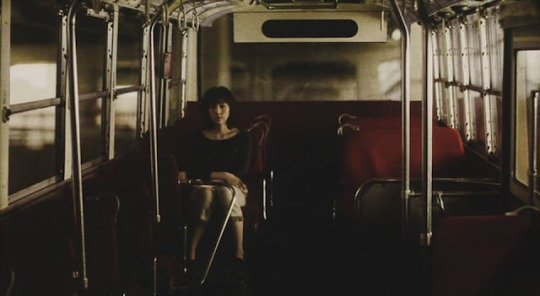
What an interesting premise that was terribly disappointing in execution. This is possibly going to be very critical, whoops.
The premise of Pulse is very fascinating. I love a good ghost story, or multi-dimensional story, especially when you tie in some aspects of tech-horror that this film has. And I do love a good apocalypse, especially a creeping one that you don't realize is happening until its too late. Those aspects of this film I appreciate. However, man what the hell.
So, clearly the conversation that this film is trying to tackle is about how the creation and ease of access of the internet is creating a worldwide epidemic of loneliness and isolation that is slowly killing the population. Not in any drastic way (though in some instances, yes, with the first death where he hangs himself) but in a looming, subtle sort of dissolving of sense of self. The people that get this... virus or whatever literally fade into surfaces and leave behind an imprint of the body. It acts like a computer virus--but it's really just highlighting what's already there. (In the case of Harue, who said she's always been alone. It's not a surprise she naturally turned to the internet/computer science to fill that void).
All of these aspects I genuinely enjoyed. The execution was dismal and confusing. I spent so much of the movie getting genuinely irritated by the logical leaps the people were making. Like, they would somehow immediately know things or suddenly forget important things, and it kept happening throughout the middle of the film that I was actually getting pissed off because it rapidly took me out of the story. Like the shit about the spirit realm being overwhelmed and having to come here, but then why are they making more spirits? Who aren't hanging around really all that much except for the few times someone hallucinates them? And then also it just wipes out everyone on the Earth? Stupid shit. Why did you bring up that random story if it has no relevance? Or is it related, and the message just got lost?
It had such a strong start, too, and even with the slow, creeping realization of what's going on, the end felt like the script writer got lost in his own sauce and forgot what story he was trying to tell. It became a weird jumbled mess that just repeatedly smashed you over the heat with a metal baseball bat about how terrible the internet is for society. Which like, totally valid, especially in 2001 but dude we get it. I got it the first 600 times you said it, I still get it now. I didn't get brain damage or alzheimer's in the last 20 minutes since you told me you were lonely.
Another positive I can give this film is the use of unease and discomfort of the use of shadows throughout this film. It was incredible. Possibly one of the best to do it, especially with all the people lurking (makes me think of Hereditary). I spent more time focusing on the background than the foreground, waiting to see what shadow was gonna move.
Another negative, this was so predictable. So, so, so predictable. Great idea. Mid execution.
Now, my theory is that the red used throughout is somehow the protector. Obviously, the red tape seals the door--but could it have been any tape? Probably, but they chose--and continued to choose--red. It is EVERYWHERE in this film. I think that's why our main girl survives. When shit starts really kicking off, she's always tied somehow to red, be it on her clothes or directly around her. Same with the loveable idiot Kawashima who wears his red hawaiian shirt until his dumbass changes to green and walks into that opened door.
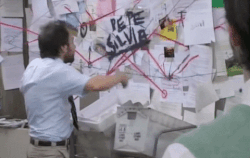
I love how bleak this movie is but I hate everything else.
4 notes
·
View notes
Text
Pulse
When watching Pulse, I kept asking myself what the message or idea was behind this movie, and it did a great job at addressing that throughout; however, there are occasional mixed signals. The message behind Pulse that the director had for the audience is that the internet is removing us from genuine human interactions. By doing so its causing everyone to be lonely and effectively become isolated in their own worlds, leading to the eventual death of their connections to humanity.
The movie establishes this idea from the very beginning when Ryosuke connects to the internet. He initially connects only to see others who are connected to the internet feeling alone. Their heads are down, and eventually, even one looks up to see the new soul who joined the system. All are connected, and all are alone. Every time we see ryosuke connect to the internet, he is met with this same sight, of individuals devoid of human connection. During the film, we even see the characters briefly talk about the effects of the internet and how, despite connecting people, the connections it makes are superficial and aren't meaningful like those found in reality.
As internet access is spreading more and more people are being labeled as missing. More are being subject to the isolation brought about by the internet and being ripped from genuine human connection. At the garden, it slowly creeps through, grabbing one person after another under the guise of being a ghost. One by one, people go to interact with a person lost to the "ghost" only for they themselves to discover the remains of their loved ones and become lost themselves. When they search for their loved ones, what they find in their search is the internet. They, too, become exposed, becoming lost to its pull.
In the end, we find that everybody is gone as the reach of the internet has become nearly global, and the only safe spot is reportedly in South Africa. This makes sense because South Africa is generally known to be behind in comparison to the rest of the world in terms of modernization. The internet's reach, while vast, is still impeded by South Africa's lack of access. The thing that is confusing here, though, is how the captain of the ship mentions that there is a signal coming from South Africa indicating its safety. Assuming that this movie is related to the expansion of the internet and the death of human connection, using a signal as a medium for establishing the safety of an area seems like quite an odd choice by the director. The captain could have said he heard a rumor about it being safe, or even that the ghosts haven't been able to make it there yet, but he chooses to indicate it via a signal. It almost makes me wonder if that's the directors way of foreboding the spread to South Africa as well as the coming lack of security for the remaining protagonist.
5 notes
·
View notes
Text
When I read your comments about bloody Mary, I chuckled for a bit. For some reason, that used to terrify me as a child. I think it's born out of people's fear of the dark, but that story had such a grip on people as kids.
Ring (1998) by Nakata Hideo - Blog 20
Ring (1998) by Nakata Hideo is a psychological horror film. It is about a journalist, Asakawa Reiko, who investigates into the mysterious death of her niece and her friends. After some clues, it leads her to a tape that is known for being cursed. It causes the viewer to die after seven days from watching it. Asakawa comes into contact with the tape while she went to investigate the site where her niece and her friends hung out. Immediately, she watches the tape and she experiences the same encounters as those who watches it. Afterwards, she partners with her ex-husband Ryuji, who has the ability to sense supernatural beings, to help her resolve the curse before her seven days. Apparently, her son, Yuichi, watched the cursed tape as well because Tomoko told him to do it. This further complicates and rushes them to figure out the case. In the end, they figure out that the curse was caused by a vengeful spirit named Sadako. Sadako was pushed and killed in the well by her own father. In order to uplift the curse, they figure out where she died and retrieve her remains. Unbeknownst to them, the curse was not lifted and Ryuji is killed on his seventh day, meanwhile Asakawa does not. She figures out that you need to let someone else watch the copy of the tape in order to pass along the curse of Sadako. In order to save her son, she is seen driving to her father with intention of having him watch the tape. After watching the film, I felt like the film was intriguing and not very scary as I thought it would be. I could see how the Ring would be more frightening in the past compared to our modern horror films. The scenes that were intended to be frightening or disturbing were humorous. An example would be the pictures of the distorted faces. The shaping and features designed to make it look scary were perceived as silly and like our modern day face filters. Watching this film reminded me of my childhood. I remember as a kid that the older children and my classmates would often talk about old scary stories and curses. It used to frighten me a lot as a kid and traumatized me growing up until I learned that the chances of it happening of them becoming true is low. Just like the story of Sadako, I believe Bloody Mary is similar to it as well. In order to trigger Mary to appear in the mirror, you have to repeat her name a certain number of times in a dim-lit room. Afterwards, she attacks the person who calls for her. Similarly, I believe they are related as being a vengeful spirit and both have a trigger to their curse in their own way.

4 notes
·
View notes
Text
The Ring
The ring tells the thrilling story of one's memories and ill deeds from the past coming back to haunt not only them, but any who should come under the ire of the spirits wrath. I'm going to be honest, anything that I could come up with in terms of connections to Japanese society is pretty thin at best. People like horror because it gives them a thrill. Brings them out of their comfort zone and shocks them into a feeling of being alive even if that's through fear.
In comparison to modern day horror this film feels rather hollow. It attempts this slow build up to try and pull you into the fear, ticking down the days until your inevitable doom until you are hit with Sadako crawling out of the TV coming to... scare you to death? in retrospect that's kind of an odd way of killing people. In the movie we never see the entirety of Sadako's face, so it could be assumed that its her face being revealed that scares people to death, but for a horror film I feel like the cause of fear could have been developed stronger. The threat of torture, being eaten, used in weird and gross ways... there are a number of ways you can instill fear in someone, but the actual source of their fear is always really vague. The scenario where they are approached by Sadako crawling out of the TV is obviously enough to unsettle anyone, but what exactly is it that leads them to die? In the movie its suggested she has the power to stop peoples hearts, but again it seems to be from fear, at least when she is pursuing people in their homes.
I feel I should also continue by saying given that we watched it as a class it's hard to get absorbed into the horror element as much as one could have if they were alone in their house in the middle of the night. I feel like the setting in which you watch a movie, in conjunction with who you are watching the movie with makes a huge difference in its ability to inspire fear within you, but I feel like its psychological build-up left something to be desired, at least within a modern day audience. In modern days, there are several good examples of media that take good use of this slow creeping psychological terror. For example, the Amnesia games. It's constantly throwing uneasy situations at you and knowing that the monster could be there at any time is what brings the unease and this crippling feeling of "I don't want to continue". If the film wanted to create this true feeling of unease, I think it should have made the possibility of death available, and perhaps used the week timer as merely a sense of finality. You would die within 1 week rather than at the end of 1 week.
I've thrown a lot of shade at the movie, but I'm not really versed in pre 2000s horror. For its time it could be a masterpiece, I just don't have the context or knowledge to really elaborate on that. Overall, the movie was decent, I just felt like if it was remade today it could be a lot stronger in its approach.
2 notes
·
View notes
Text
Woah. I hadn't even considered connecting the butterfly to Icarus, but now that you mentioned it, the connection seems so obvious. I really liked your analysis. Their ambitions do drive them apart. I think the only exception might have been ageha's ambitions, although that's up for debate. When ageha collected the yen and tried to buy back yen town club, that was her attempt at reconnecting the gang; however, I'm not sure if that would be considered her ambition or not. It's something she wanted to do, but it seems like it's out of desperation, not necessarily out of a dream or something she aspired toward.
Iwai - Swallowtail Butterfly
This movie was a ride from beginning to end. I don't know if it was just my viewing experience, but I almost thought I was watching a series instead of a movie. This seemed to be another movie where vignettes or parts of a hole form to create an overall meaning to the film.
Figuring out an overall theme or message was a bit hard to figure out with the length and variety this film had to offer. But, if I had to say, I think Swallowtail Butterfly is a critique on ambitions power to corrupt people and tear communities apart. I think the obvious symbolism of this movie is not movie or yen itself, but how yen stands in for ambition. None of the characters truly seek to make the most yen they can, but to realize the wishes they so sought before but were not able to. The film then, presents us with an assemble cast of bizarre characters who seek to make yen, and in the process, forget about the community from which they came from. Once they realize that such a life is not truly worth it and that the yen has corrupted them, they return to the community. This can be likened to the squashed butterfly that Ageha saw in her childhood, a butterfly that, like Icarus of greek myth, tried to fly too high or sought an ambition to lofty, and forgot about the dangers it came with.
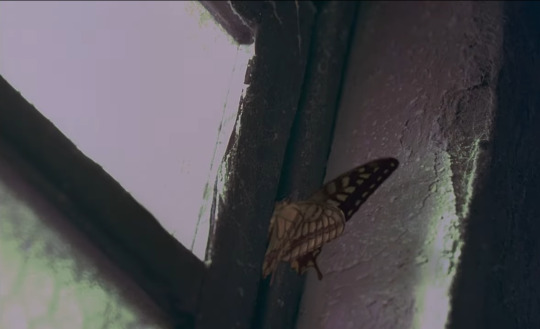
5 notes
·
View notes
Text
Swallowtail Butterfly
Swallowtail butterfly was a wild film. It focused on the zainichi experience in Japan, but with also illegal routes and connections in all sorts of places. We had connections between Glico and a crime syndicate ran by her brother, Ryou Ryanki. The people who own the junkyard being the assassin duo we see earlier in the movie taking out the guy on the moving train. Ageha's interactions with Glico and Ryou Ryanki teasing out the relations and making us the audience hope for their initial reunitement. I will be honest I was kind of lost as to where this movie was taking me and to what the overall message behind the film was, but I talked with some of our classmates after the film.
One major theme built within this movie is the idea of found family. Ageha is originally left to a family member or someone after the death of her mom, and is pushed off onto Glico. Glico almost sells her off only to find that she would be abused and Glico couldn't handle that on her conscious. Originally unwanted and unloved by anyone left in her life, Glico takes her under her wing and slowly but surely Ageha begins to find a family in Glico and Feihong and the people at the their little outpost. She even forms family like connections with Arrow and the others who leave after the counterfeit currency scandal.
The essence of found family is particularly strong between Glico and Ageha. Ageha is originally given her name by Glico, and the idea of the butterfly becomes this symbol of their relationship. Glico has a tattoo of a butterfly on her chest, which is eventually emulated by Ageha in this moment that seems to complete the unification between the two characters. Their bond was strong, but by getting the tattoo she symbolically made their bond permanent and unbreakable.
One thing I thought was interesting was just how aggressively Glico was taken advantage of by the Japanese. They understood that she was a zainichi yentown, but took her image and changed it into something profitable while sabotaging the people who had helped bring her into the limelight. They could have easily cut Feihong into the deal and/or taken advantage of him in a similar way, but they deemed it not worth their time and essentially buried him. The yentown are looked so down upon as people taking advantage of the country and the strength of the Japanese yen, but when it comes down to it, the people taking advantage of the people are the Japanese. Now don't get me wrong, the yentown did get into the counterfeiting, but by taking advantage of Glico, its hard to say that the Japanese are any better.
2 notes
·
View notes
Text
I thought it was kind of strange when nishi threw their ball completely away from them. It seemed out of character with what I had known about him, but as the film progresses it feels more and more in-line with his character.
Kitano's Hanabi

Hanabi by Kitano was a well designed aesthetically pleasing film. This film follows a Japanese Detectives’ cycle into detachment from society and life itself. The director’s approach to this film was unique but still enjoyable. There were some confusing portions of the film, especially in the beginning, but as the film progressed so did the story begin to be aligned better. The directors work to tell the story with two separate themes or outcomes. The first outcome follows Nishi and how he decides to deal with the circumstance’s life has put him in. The second outcome is Horibe and how he has dealt with his situation.
Before getting into the major lenses in this film, I want to write on how the director directed this film. The sound design of this film and the music was so serene and enjoyable. There were many bouts of classical, lyric-less music but played to the minimal dialogue throughout the film. I was put off in the beginning because of the minimal dialogue throughout the film, especially with Nishi and his wife. This was also strange to see played out with other characters like Horibe and the other police officers interacting with Nishi. As the film progressed though, it began to form that this was just his character type.
Another interesting approach that director Kitano did was to contrast two major and opposing sides of society. The side of the police and that of the yakuza. In between the two we see sides of Japan that I have not seen and that does not receive as much attention. From the junkyard mechanic selling stolen vehicles and parts of police cars, to him crashing into other vehicles. Even the police who are supposed to be the law-abiding citizens are seen slapping criminals around and treating everyday citizens poorly. One example was when Nishi threw the teenagers’ baseball down an opposing road as the teens were playing baseball. This interesting side of Japan had an atmosphere of coolness and a complete disregard of what would traditionally be accepted as normal.
To circle back to the two outcomes, Nishi’s tells a story of a man falling into despair due to the uncontrollable outcomes of his life. His wife is diagnosed with leukemia, his child dies at a young age, and his partner is paralyzed on an assignment that Nishi was supposed to do. These outcomes push Nishi over the edge as he decides to borrow from the Yakuza, rob a bank and use the money to create fleeting moments of happiness with his wife. Horibe on the other hand, confronts his own despair with his wife and child leaving and being left paralyzed head on. He goes to the beach and outside struggling to find a purpose now that all he has known is taken away from him. He attempts suicide but is saved by his friends. From then, Horibe begins to paint and remove his despair from internal out onto the paper through painting. Once he begins painting his art acts as a foreshadowing of Nishi’s action. From the painting of the penguin to the snow weather driving, to the suicide painting and Nishi’s own suicide.
I think the director is conveying us to take the path of Horibe. Although our situations may be dire and may feel like there is no way to move on, through patience and focused effort inner balance can be restored. While Horibe’s final painting may still present linger feelings within himself, the movement of this action to the paper instead demonstrates a significant level of character development.
3 notes
·
View notes
Text
花火 - Fireworks
I want to start out by saying wow. Once Nishi decided to rob the bank the plot became pretty obvious and I knew what was coming, but even still. At the end I was silently laughing, not because something funny happened, but because it really did end, just like that.
Hanabi tells a story of two people whose lives were irreparably changed. Detective Nishi and his partner Detective Horibe. In Hanabi, we see Horibe become crippled, forced to retire, and turning to art to try and fill his days. We see how he comes to learn how to interact with his environment and pick up on the little things, incorporating it into his art. We see as he struggles to find meaning in his life anymore and grows bored, despite pursuing this new found skill. His thoughts devolve and eventually he creates a scene of suicide surrounded in snow. 自決 in a torrent of 雪 and fading 光.
Nishi, unlike his old partner, takes a more direct way to the same answer. Nishi, knowing his partner Horibe is gone and his wife is on the brink of death, takes measures to spend as much of the time he has left with his wife as possible. He turns his entire life around, robbing a bank, attempting to get the yakuza off his back, and abandoning his home to share the precious moments his wife has left. They leave home and share special experiences they wouldn't have otherwise, like ringing the bell during the day, and going fishing at a river. Knowing of Miyuki's impending death, they lean away from the constant suffering of fighting against the leukemia and cherish the moments they have and damn the consequences.
From the beginning we know something is bothering Nishi. Despite being in many of the opening scenes, Nishi doesn't actually say anything until 25 minutes in. Throughout the entirety of the film he is a man of extremely few words. Once the plot reveals itself and we know he is going against the rules of the world for his wife, we are able to recognize his silence as quiet resolve. His actions speak louder than his words, and his love for Miyuki speaks volumes. Nishi, despite being potentially left alone with Miyuki's death and Horibe's retirement, could have chosen to continue on. He could have, like Horibe's vision of the world and the actions of his wife and child, thought about himself and started a-new, but he didn't. He chose to love his wife, to show her the best the world and he had to offer, and to exit right along side her.

2 notes
·
View notes
Text
It's interesting how difference is treated within Japan. For Americans, discrimination works in our favor, and we are given "Gaijin power," but for Koreans and, presumably, other Asian ethnicities, it vehemently works against them.
Yukisadas Go
Yukisadas film was one of the first in this class that has taken a critical stance on racial and nationality lines. Likely born out of the developing changes over time and the Japanese societal ways of integrating other people into their society. This film follows Sugihara, a Japanese born North Korean and his trouble integrating into the Japanese society. He wrestles with discrimination topped with the teenage troubles of love and rebellion with his family. I highly respect this film’s approach to tackling such a difficult topic and bringing recognition to the residents in Japan that face this issue.
Being non-Japanese in Japan and then a minority on top of that garners some strange interactions with people. In public settings, many foreigners experience a sense of isolation just based on being a foreigner. For example, it is not unusual for a foreigner or minority sitting down in a bus or train with open seats next to them and several people avoiding sitting next to them. In some occasions this could even occur in a packed train or bus. On the other hand, open seats with local Japanese are quickly filled over the ones which are next to a foreigner.
Another unfortunate story I hear from mixed Japanese people is that because of their looks and being mixed, they are not treated as Japanese. Even though they went to Japanese school, can only speak Japanese, and are fully integrated in the culture, they are treated as not Japanese. I have heard of biracial Japanese people being spoken to continually in English regardless of how much Japanese they speak. These same racial and nationality challenges are seen within Go. Sugihara is bullied by those in school because of his North Korean nationality. Going through these difficulties exacerbate his rebelliousness and causes him to resent his nationality. This is seen through many of his narration throughout the film where Sugihara criticizes his father in his narration for his pride in North Korea and eventually for him changing to a South Korean passport to be able to travel.
Yukisada did a great job directing this film. He allowed the story to be told through the actors directly and used this coming-of-age film to highlight grievances that people all throughout the world face when living in foreign countries. This relatable and telling film brings attention to racial and ethnic dilemma and establishes a platform to discuss on. I also enjoyed Yukisada’s use of narration by Sugihara and even the multiple instances of flashbacks throughout the film. Even though there were several instances of these flashbacks, the overall timeline and progression of the film remained easy to follow. Overall Go was a great film, that I will have to recommend to my Japanese friends to invoke some meaningful and hopefully challenging conversations.
3 notes
·
View notes
Text
Go - Yukisada
Go tells the story of a Japan-born Korean who runs into all sorts of turmoil with regard to his identity. In the beginning, we see the main character's (Sugihara's) father switch between his nationalities, giving very little weight to his national identity. He knows he lives in Japan, but chooses whatever nationality suits him best. Throughout the film, Sugihara's father, Hideyoshi (who played goro in tampopo), is kind of an asshole who plays to whatever works best for him at the moment. His choice form of punishment is beating down his son to the point of causing permanent physical changes to him (for example, Sugihara and the two teeth he lost due to his dad punching him in the face). Even when Hideyoshi recognizes he is wrong (when Sugihara is yelling at him after Hideyoshi's brother died), he still chooses to beat down on Sugihara and a full-on ring fight commences, announcer and everything.
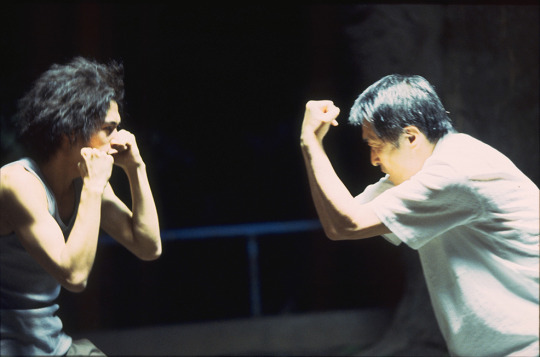
His old ways of disciplining Sugihara and his old ways of thinking about race and identity are a key factor that separate he and his son. Sugihara and his ideals are those of the new generation, and he continuously has to battle with those of the old, whether it be when boxing against his father, or when he argued with Sakurai over idea's implanted into her by her fathers old way of thinking.
Repeatedly, we are told by Sugihara that this movie is about his love story, but more realistically, it's about his fight against the restrictions of identity, and the fixed expectations that come with said identities. He fights to try and be seen as an individual rather than a classification, and only succeeds after being raked through the coals by both Sakurai and Hideyoshi. It takes the fight with Hideyoshi for him to clear his head and hear Sugihara's plight, while Sakurai has to seclude herself from Sugihara to have time to contemplate what she has been fed all of her life.
Personally, I feel like this movie not only appealed to audiences of the time, but still has a great deal of relevance today. Nowadays, it feels as if people are once again clinging to these ideas of identity and self-imposed segregation, and with this, people are becoming hostile towards those outside of their in-groups. It's extremely prevalent within politics, between democrats and republicans, where if you identify with one group, a hefty sect (albeit not all) of the other group will deem you as "the enemy" and as someone to convert. The movie helps to bring this idea that I am not simply the product of my parts. I am not simply a Korean and thus of tainted blood. I am an individual, just like everyone else, and should be seen as one.
6 notes
·
View notes
Text
Overall, this movie's main theme was food and the different relationships people have with it. It goes over how it's something everyone loves and it plays a big part in everyone's lives. So, when we see the different scenes of different people, I feel like those are just supporting the movies overarching theme. It's showing other people and their relationships with food solidifying the theme rather than having it just focus on the success of building a ramen shop.
Tampopo by Itami Juzo - Blog 16
Tampopo by Itami Juzo, is a Japanese comedy film that tells a story about a widowed women who owns a small ramen shop called Lai Lai. She meets a truck driver named Goro who saves her son from school bullies and comes in to eat her food. After hearing Gun’s advice on her ramen, she begs him to help teach her to cook proper ramen. He agrees to teach her and film proceeds to show a series of events of her learning, developing, and improving her skills. She meets plentiful of new people who support her journey. In the end, she meets her goal and Lai Lai is renovated and renamed to Tampopo with many customers in line waiting to have her food.
My overall thoughts on this film was interestingly funny, gross, and yet heartwarming. The opening scene of the man in the white suit was neat as he was looking and talking towards the camera, as if he was talking to the audience watching the film. Once the main protagonist was introduced, the widowed ramen shop owner, the story proceeds to be a heartwarming learning journey, but occasionally there were scenes that seemed completely off topic from the main plot. These scenes felt similarly to ads as they abrupt and were related to food as well.
I found the first scene where a group of business executives visit a French restaurant for dinner. The executives ordered the same thing as the director, but there was one subordinate who orders a whole meal knowing the menu compared to all of them. This scene was very funny to me as each person, including the director, were red as an apple from embarrassment and looking down.
The next scene shows an older man having a sweet time with his mistress. I thought it was going to be a normal sexual interaction for the couple…but behold. We ended up watching them make out by exchanging an egg yolk until it popped in her mouth. Eventually the man has an encounter with an oyster diver and their make out scene was just as disturbing to me especially with his bloody lip. This man definitely has an interesting fetish for food.
Although not the last scene, I thought this one stood out to me as well. An older working man runs home to his dying wife, children, doctor and nurse. It was sad watching the man tell his wife not to close his eyes because he wanted her to keep living. He goes as far to shake her excessively and then he tells her to get up and go cook. I was surprised by this, but she immediately gets up and cooks dinner while struggling to keep her balance. After serving dinner to her kids and her husband, she smiles happily knowing they loved her cooking and she collapses. The doctor and nurse calls her time of death right away after checking her pulse. This was really sad moment. The father then tells his children to keep eating and cherish the last meal their mother made for them. They memorialize her through food, feeling the love she put in it before leaving them.

3 notes
·
View notes
Text
Tampopo
Tampopo discovers the true depths and importance of food within the soul of every man woman and child. The film focuses on Tampopo, a ramen shop owner looking to revitalize her shop and really learn what it means to cook ramen. The movie goes through the motions showing the blood sweat and tears, and most important the dedication to study that one needs to truly master a recipe. It shows people's connections to food and how people from all walks of life come together to enjoy meals from the same place. One way the film did this was by bringing together the crew in this shot.

in this one shot you have people who are dressed as individuals from all different walks of life. Starting from the left you have Goro, who looks like he just came from the Australian outback and is on leave to Japan; Gun, who looks like he could be a painter or someone focused in the arts; Sensei who looks like a film director stopping in at his local ramen shop; Shohei, who appears to be a normal salaryman or office worker coming in a suit and tie; and finally, Pisuken who attire makes him look like a detective. In reality, they all have jobs that work to create Tampopo the ramen shop what it is, but their portrayal in this scene really helps to solidify the idea that food lovers come from all walks of life. It goes further in developing this idea with its interludes from Tampopo's life. There are several different people enjoying food in different ways around different circumstances, with criminal's and crooks, to lovers, to business men in fine establishments. It talks about the customs surrounding eating and how they differ between peoples. For example, when the foreigner's way of eating pasta is being studied, only to be revealed to be completely opposite to the way they were being taught.
Additionally the film explores the different relationships people have with food. Some just like to enjoy their meals around a bar while others... well... we all saw the scene where they were trading the egg yolk between their mouths.
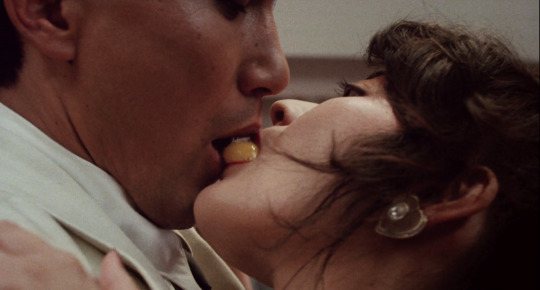
Their sexuality surrounded food and it's thought to bring this kind of orgasmic reaction between the two of them. This goes to show the power food can have and the emotions and feelings it works to manipulate.
3 notes
·
View notes